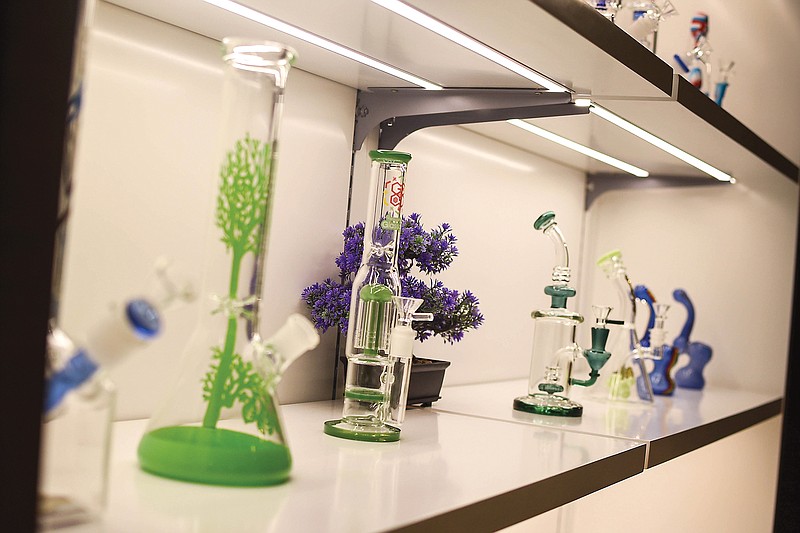Medical marijuana sales in Missouri crossed the $200 million mark in December, only 14 months after the first medical marijuana dispensary opened.
More than 160,000 Missourians have access to medical marijuana products, said Lyndall Fraker, director of the section on medical marijuana regulation in the Department of Health and Senior Services.
"We believe it will continue to grow," Fraker said. "It will certainly hit 200,000 patients before July, which would be the three-year mark.
"We believe we have some really good operators in Missouri that are doing a really good job."
Applications for patient medical marijuana cards have steadily grown during the first 2½ years, he pointed out.
More than 10,000 patients have applied for cards each of the past 10 months.
"As more facilities opened up and came online, it stimulated folks to go ahead and get their patient cards," Fraker said. "I believe the number tailed back down a little bit."
Supporters of the state program gathered enough signatures to get medical marijuana on the November ballot in 2018, when Missourians overwhelmingly passed it (by a 2-1 margin). Its passage made marijuana use legal for treatment of cancer; epilepsy; glaucoma; intractable migraines (persistent migraines that don't respond to other treatments); chronic medical conditions that cause severe, persistent pain or persistent muscle spasms, including, but not limited to those associated with multiple sclerosis, seizures, Parkinson's disease and Tourette's syndrome; debilitating psychiatric disorders (when diagnosed by a state licensed psychiatrist), including but not limited to post-traumatic stress disorder; human immunodeficiency virus or acquired dependence (if a physician determines cannabis would be effective and safer); any terminal illness; or (in the professional judgment of a physician) any other chronic debilitating medical condition.
Drafters of the amendment (and medical marijuana industry experts who had witnessed other states' implementation of similar programs) expected 2-3 percent of qualified citizens to be licensed within the first two to three years of the program.
That has come to pass.
"Facilities began receiving licensing and certification from the Section for Medical Marijuana Regulation within the Department of Health and Senior Services (DHSS) two years ago this week," according to a DHSS news release. "And they began receiving their approval to operate following the commencement inspection process in June 2020. More than 300 facilities are now operating in Missouri as cultivators, manufacturers, dispensaries, testing laboratories, transporters and seed to sale providers."
The release also points out 158,169 patients in the state have qualified for and received their licenses to purchase and possess the products. That's about 2.6 percent of the population.
The DHSS maintains a map on its website that shows how many patients each county contains.
In Cole County, 1,884 patients (about 2.4 percent of county residents) hold medical marijuana licenses as of Dec. 1. Boone County has 6,506 licensed patients; Callaway, 1,195; Maries, 197; Miller, 718; Morgan, 760; and Osage, 221.
The county in Missouri with the most patients is Jackson, which has 20,373. St. Louis County has 18,774 and the city of St. Louis has 4,685.
"It seems as though the I-70 and I-44 corridors have the majority of patient licenses along them," Fraker said. "Maybe those counties along the northern border are mature populations."
The county with the fewest patients is Worth County, with 39 (2 percent of its population of 1,973). It is followed by Scotland County with 54 (1.9 percent of its population of 4,843), Holt County with 59 (1.4 percent of population of 4,223) and Mercer County with 60 (1.7 percent of its population of 3,538). Each of these counties is in northern Missouri.
Several counties along Missouri's southern border have higher percentages of residents who have obtained medial marijuana licenses than the state average.
Butler County, with a population of 42,130 according to the latest U.S. Census data, has 1,364 licenses (3.2 percent of the population).
Taney County, population 56,066, haa 1,921 licenses (3.4 percent of the population).
Stone County, population 31,076, has 1,122 licenses (3.6 percent of the population).
Patient application forms, tutorials, walk-through videos, reports and links to other medical marijuana resources can be found at health.mo.gov/safety/medical-marijuana/patient-services.php.

